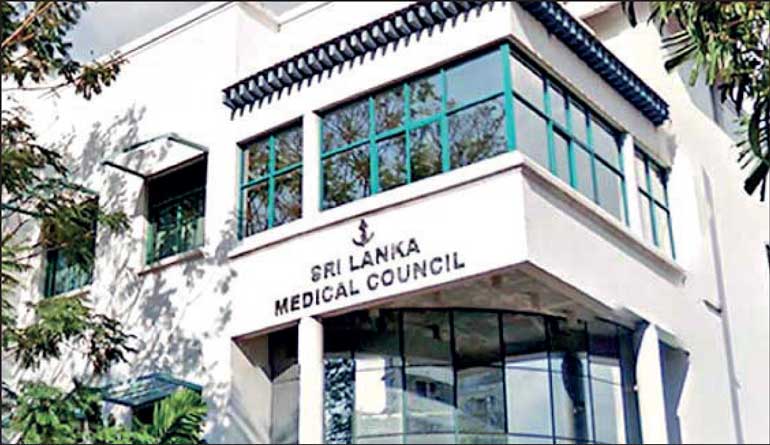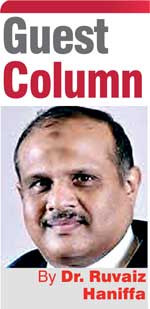Friday Feb 20, 2026
Friday Feb 20, 2026
Wednesday, 9 July 2025 00:24 - - {{hitsCtrl.values.hits}}

The powers that be at the SLMC and medical profession itself must reflect objectively on the core statutory function of the SLMC
 The Sri Lanka Medical Council (SLMC), as the sole regulator of medical professionals in Sri Lanka, has played a vital role in shaping the nature, quality, and character of medical professionals and the medical profession for a century.
The Sri Lanka Medical Council (SLMC), as the sole regulator of medical professionals in Sri Lanka, has played a vital role in shaping the nature, quality, and character of medical professionals and the medical profession for a century.
The speech made by a Judge of the Supreme Court of Sri Lanka, His Lordship Justice Yasantha Kodagoda on 5 July 2025 at the Centenary Celebrations of the SLMC, deserves praise and our sincere thanks for its forthrightness. The speech presents to the medical community at large an invitation and opportunity to look more inwards than outward in its regulatory role for the future. His Lordship’s speech was aptly titled “Strategies for addressing malpractices in healthcare systems”. This is also the very point that was reiterated by the current registrar of the SLMC who stated, “With a vision for continuous improvements and adaptation, the SLMC is poised to navigate the future of healthcare with the same dedication that has defined its first century.”
We have been told for at least the past decade that there is a new Medical Bill which is with the Ministry of Health which will address the issues raised by the medical professions and health professionals which will enable the dedicated men and women of future SLMCs to perform the duty of the SLMC. In summary, it is to protect the citizens of Sri Lanka from the medical professionals (‘The SLMC is a statutory body established for the purpose of protecting healthcare seekers by ensuring the maintenance of academic and professional standards, discipline and ethical practice by health professionals who are registered with it’).
Increasing public concern about SLMC
As pointed out by Justice Kodagoda, issues pertaining to medical ethics by practicing medical professionals, and the manner in which the SLMC has handled such issues in the recent past in particular, has led to increasing public concern about the SLMC. His Lordship went further and even proposed a mechanism/s to overcome such public concern with a particular reference to ethical issues resulting from the practice of medicine. He quite correctly used words such as ‘neutrality’ and ‘representation’ to a ‘Complaints Secretariat’, which he proposed to be instituted to handle issues on complaints against medical professionals. He even suggested that non-medical professionals should be allowed to serve on such disciplinary panels.
As of now the composition of SLMC Council is exclusively limited to doctors as far as the medical profession is concerned. Thus, whatever process is suggested within this fundamental framework, it will, as of now, ultimately result in Self-regulation of Doctors by Doctors. This is the real question which needs addressing and one hopes that the new Medical Bill, decades in the making, will address the fundamental question of ‘Can the medical profession self-regulate itself or does the composition of the SLMC need fundamental reform to include non-medical personnel on its council to unbiasedly perform its statutory duty of protecting the Sri Lankan citizen from the Sri Lankan medical profession?
The institution on which the SLMC was modelled on, over a century ago is the General Medical Council (GMC) of the United Kingdom which was established in the year 1858. Initially its members were elected by the members of the profession and enjoyed widespread confidence from the profession. The 167-year-old GMC has undergone many reforms to serve the public and profession in a more transparent, accountable and responsible manner over the years. With regard to public concern that the GMC was self-regulating itself to the detriment of public trust in it, was addressed in 2013. The General Medical Council (GMC) in the UK was reduced to 12 members from 24 members on 1 January 2013. The Council has 12 members, include 6 medical professionals (registrant members) and 6 non-medical individuals (lay members). The GMC also has an Executive Board that handles daily operations and over 1,000 associates who support its work.
Is Council of SLMC unbiasedly capable of ‘self-regulation’?
An interesting article appeared in the comments section of the British Medical Journal of 12 November 2022. That opinion piece was titled The GMC (General Medical Council) has been failing for 30 years. The opinion of the authors, Martin Mckee and Scott L. Greer, dealt with matters of transparency pertaining to the regulatory role of the GMC within the profession in the United Kingdom. This opinion piece was brought to the notice of the SLMC by way of an e-mail and regular post on 17 November 2022. The point of discussion which was requested from the SLMC was ‘is the current composition of the Council of the SLMC unbiasedly capable of ‘self-regulation’ of the profession at large?’ and ‘Has/Is the Sri Lanka Medical Council acted/acting in the best interest of the citizens of Sri Lanka or Is it acting in the self-interest of the profession, or more specifically the self-interest of an elected/selected segment of the medical profession?’
With regard to the composition of the SLMC Council and the wider Medical Bill which has been proposed, the SLMC called for submission of proposals by way of a newspaper advertisement on 5 October 2018. The Sri Lanka Medical Association (SLMA) Council at the time submitted a set of proposal to be included in the new Medical Bill to the SLMC on 22 October 2018 (the deadline for submission was 28 October 2018).
As the SLMC is celebrating its centenary and has stated its desire ‘for continuous improvements and adaptation, to navigate the future of healthcare with the same dedication that has defined its first century’ we reproduce below a few submissions made for the consideration of the SLMC back in 2018 with a particular reference to the Council of the SLMC and the process of appointment to the Council of the SLMC.
(A) The composition and the term of office of the SLMC
1. The SLMC shall consist of a total of 15 members appointed by the Constitutional Council of Sri Lanka.
i. Ten members shall be reputed medical/dental practitioners, who have been registered with the SLMC for a minimum period of 20 years.
ii. Two members shall be Deans from the Faculties of Medicine, who have been registered with the SLMC for a minimum period of 20 years.
iii. Three shall be leading professionals of high repute from education, law, finance or management professions, from the private or public sector, with a minimum period of service of 20 years after obtaining the first professional qualification or degree.
2. The President of the SLMC should be elected by the members of the SLMC at its first meeting.
3. The term of office of the Council shall be three years.
4. Any person can serve in the Council only for a maximum of six years in toto.
(B) The process of appointment to the Council of the SLMC
1. The Registrar of the SLMC shall call for applications from eligible members of the Medical/Dental profession and members of the education, legal, finance or management professions, at least three months before the expiry of the term of office of the SLMC.
2. All applications received shall be forwarded to the Constitutional Council through the Executive President of Democratic Socialist Republic of Sri Lanka.
3. The Constitutional Council shall appoint the members within a period of six weeks from the date of submission of the names to the Constitutional Council by His Excellency the President of Sri Lanka.
4. The Constitutional Council shall ensure that the appointees can discharge their duties free from the influence of politicians and trade unions and can perform their functions without fear or favour.
These are a set of submissions among many the SLMC would have received during the period it sought public opinion for the new Medical Bill. We hope that the SLMC in its centenary year will revisit these proposals carefully and seriously address the issue of self-regulation of the doctors by doctors, and introduce more transparency in guiding the medical profession in Sri Lanka in to the future, keeping in mind its statuary role of ‘protecting healthcare seekers by ensuring the maintenance of academic and professional standards, discipline and ethical practice by health professionals who are registered with it’.
As the SLMC enters its second century the powers that be at the SLMC and medical profession itself must reflect objectively on the core statutory function of the SLMC. The outcome of this reflection ought to be finding the most suitable answer to the question (not the ideal answer) – How can the SLMC as a statutory body protect the health seekers by ensuring the maintenance of academic and professional standards, discipline and ethical practice by health professionals who are registered with it?
In doing so the SLMC must not revolve around what it thinks it is doing well but revolve around selected core issues and evolve in manner to serve the interest of the Sri Lankan public which it is statutory bound to do.
During the celebration it was revealed to the public that the long overdue new medical act which has been unanimously approved by the Council of the SLMC will indeed address the most fundamental of structures in the SLMC which is its Council. It has been proposed to include non-medical members as Council members. If true, this is indeed a welcome development for the future of the SLMC commitment to begin giving up the idea of exclusive self-regulation of doctors by doctors. We sincerely hope that the new medical act can be presented to Parliament as soon as possible for discussion by the people’s representatives.
(The writer is Past President, Sri Lanka Medical Association, 2018.)